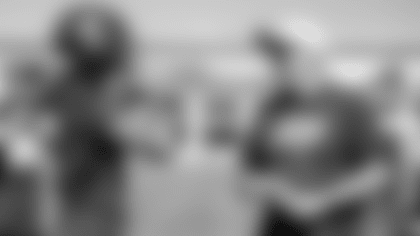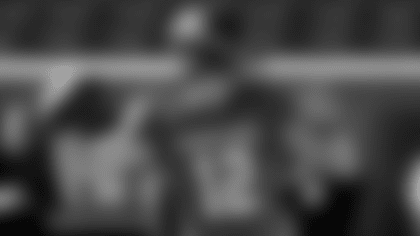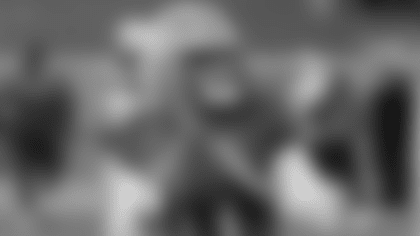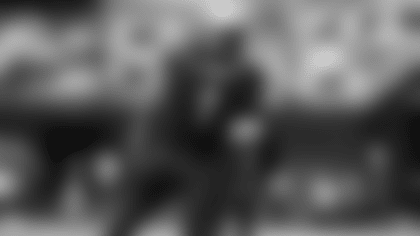My favorite e-mail of the week, simply because I was able to bat it around like a kitten would a ball of foil, comes from Tallahassee's Will Martin. Check it out:
Hi answer man! I have a challenge for you: watching as much football as you do I'm sure you've seen the DirecTV commercial (in which a man wows his child by snapping his fingers and pausing live TV) that showcases a Bucs @ATL game on the television. My challenge to you is, can figure out exactly which game it is from the few seconds of footage in that commercial? Good luck.
You call that a challenge, Will? It is to laugh. It's amusing when one of you tries to test the Answer Man's powers with such weak ammunition. I knew what game that was after the first time I saw the commercial.
Let's cut right to the chase: The footage in question comes from the Buccaneers' game at Atlanta last November 14.
How do we know this. Two things: 1) Artificial turf, which means Atlanta, not Tampa; and 2) The Bucs' quarterback is clearly Brian Griese, and the only time Griese has played at Atlanta for the Buccaneers was last November.
Sorry, that was just too easy. There are probably hundreds of Buccaneer fans out there who agree with me, who recognized the game right away, too.
So let's raise the difficulty rating a bit here, shall we? What if the question was not only what game is being shown, but specifically which play?
Now we're talking! That's a question into which the Answer Man can sink his teeth.
What is actually happening in the portion of that 24-14 Atlanta victory that is excerpted in the DirecTV commercial? Let's take a look.
The first thing you should know is that there are actually four different plays shown in that commercial. Though it's presented somewhat linearly, as if the father and son are pausing, rewinding and restarting a specific play in the game, the bits are not taken from the game in any reasonable order. Still, the Answer Man was able to locate each play, with a big assist from the Buccaneers' video department: Dave Levy, Pat Brazil, Chris Bryan and Wes Bryan.
With that crew providing technological assistance and their own memories of that game, we were able to compare each clip in the commercial to the written play-by-play and to the Bucs' own sideline and end zone footage of the action.
It's a weird mix of plays, all from the second half but none on the same drive. Three were big plays for the Falcons, one was a brief moment of glory for the Bucs.
- The first game moment shown in the commercial is a quick clip of a Falcon falling to the ground at the feet of running back Michael Pittman. That Falcon was cornerback Allen Rossum, who had just intercepted a Griese pass with five minutes left in the game. Pittman comes to head him off and Rossum slips headfirst to the turf at his feet.
- The second clip is the one that makes the game so easy to identify, the one with Griese. In it, you see the Bucs' quarterback dropping back as Atlanta blitzers come off both edges, including LB Matt Stewart from around left tackle. The commercial switches back to the father and son after just a moment of this play, so you don't see Stewart and end Travis Hall get to Griese at the same time and sack him for a loss of nine yards. That play occurred with five minutes left in the third quarter and the Bucs trailing 17-14; it was part of what killed a promising drive that had reached a first down at Atlanta's 31 on a Michael Clayton 21-yard catch.
- Another very brief clip follows of a Buccaneer running through the left edge of the end zone. That Buccaneer is tight end Ken Dilger after he caught a 22-yard touchdown pass from Griese about five minutes before Clip #2 above. You don't see the catch, just Dilger running through the end zone.
- The final clip was maybe the game's key moment. With the Bucs still trailing by three with 11 minutes left in the game, another good Tampa Bay drive reached the Atlanta 28. On third-and-one, Pittman was stopped trying to get a first down up the middle. The Bucs then decided against trying a 46-yard field goal to tie the game – remember, that was just a few weeks before the Bucs released K Martin Gramatica after two seasons of struggles – and instead ran Pittman again on fourth and one. Stewart made the stop for a loss of two and the Falcons celebrated wildly. That part is shown clearly, then rewound in the commercial to make it even more painful.
It is neat to see the Bucs featured, somewhat, in a national commercial, though the Answer Man would have preferred they use clips from the Bucs-Falcons game in Tampa, which was a 27-0 whitewash for the home team about a month later.
Personally, I prefer that Gatorade commercial with all those famous plays – Jeter's backhand flip, "The Catch," Jordan's buzzer-beater against the Cavs – altered to appear as if they failed. That's a nice bit of magic.
Okay, now on to the rest of your questions. It was a good mailbag this week, chock full of nuts-and-bolts football questions.
**
- Andrew of Sarasota, Florida asks:
Hello Answer Man! I have one question, just curious, you know the Colts are 11-0, well how many times in NFL history has a team with a very good record (13-3, 14-2, 15-1, 16-0) did not even make it to the Super Bowl? In which some kind of upset happened. Thanks Answer Man! Happy Holidays.
Answer Man: Well, I think ESPN.com has covered this ground pretty well in recent days, so there may not be too much original material I can add here. Actually, most of the focus was on previous 10-0 teams and how they eventually fared, whereas your question is aimed more at teams that finished with 13 or more wins but didn't fare well in the playoffs. So I guess I can work on that angle. Let's take a look.
Considering the way you worded your question, I'm going to start when the league went to a 16-game schedule in 1978 and look at all the teams that finished with at least 13 wins through 2004.
(Note: For the purposes of this study, we are always going to refer to the year in which the regular season was played. Thus, we would refer to the 1985 Chicago Bears, who actually won the Super Bowl in January of 1986.)
There were 40 teams over those 27 seasons that finished with 13 wins or more. That includes a 13-2 San Francisco team in 1987, when a players' strike cost one game out of the schedule. There were six seasons in that stretch in which no teams won 13 games, including the 1982 strike season that ended up playing a nine-game schedule. Other than '82, the other seasons in that group were 1979, 1980, 1988, 1993 and 2002.
Now, obviously with 40 such 13-win campaigns in 27 years, there were some years in which multiple teams accomplished that feat. And only one of those teams could win the Super Bowl. It's hard, for instance, to think of the 1990 San Francisco 49ers (14-2) and Buffalo Bills (13-3) as flops because they lost to the 13-3 New York Giants on the Giants' way to the championship.
So let's first look at those teams that won at least 13 games in a season in which no other team also reached that plateau. There are nine such teams in this study, and five of them won the Super Bowl. That would be Pittsburgh in 1978, San Francisco in 1981, Chicago in 1985, San Francisco in 1989 and San Francisco again in 1994.
I suppose that means you could call the other four teams in that group the biggest high-win flops. All of these teams won had the league's best record and at least 13 wins but went down in the playoffs:
- Washington in 1983 (lost the Super Bowl to the Raiders) * San Francisco in 1987 (lost to an 8-7 Minnesota team in the divisional round after the Vikings had also bumped off 12-3 New Orleans) * Kansas City in 1995 (lost to a 9-7 Indianapolis team in the divisional round) * Tennessee in 2000 (lost in the divisional round to a 12-4 Baltimore team) Of those four, it seems like the 1987 49ers took the hardest fall, going out to a team that was barely .500 during the regular season. Ah, but not so fast. There is a hidden factor here that tells a big part of the story.
As we mentioned above, that was a strike season. As opposed to cancelling a big portion of the schedule, as the league did in 1982, the NFL skipped one week and then began holding games with "replacement players." Those men played for three weeks before the strike ended and the original teams got back on the field. These strike teams had to be assembled quickly and there was no reason to believe that a replacement team for any specific squad would perform as well as the one it was replacing.
That was the case here. The 49ers' replacement team won all three of its games, while the Vikings' replacement team lost all three of its games. Thus, if you look at the "real" 49ers and Vikings of that year, their records were a lot closer: 9-3 for San Francisco; 8-4 for Minnesota. For that reason, the Answer Man doesn't see this as as much of a shocker as it seems.
Washington made the Super Bowl in '83 and lost to Marcus Allen and an awesome Raider team. Tennessee fell to Baltimore, the eventual champs in 2000 and a division mate with whom the Titans had split during the regular season. One would have to give the title of biggest disappointment from that group to Kansas City, which lost to a 9-7 wild card team (though it should be pointed out that those Colts nearly upset Pittsburgh in the AFC Championship Game on an end-zone Hail Mary at the end of a 20-16 loss).
Another season that's worth noting here, since I did the research and all, is 1999. That year, the Bucs nearly made the Super Bowl with an upset win over St. Louis in the NFC Championship Game. Had they done so, they would have had a chance to overcome a very top-heavy league that year.
Four teams finished with at least 13 wins that year, a record since the 16-game schedule was introduced. And boy did they fight it out.
In the AFC, 13-3 Tennessee had to play a freaking wild card game, if you can believe that. And they almost lost to Buffalo before being saved by the infamous "Music City Miracle." The next weekend, the 14-2 Jaguars ended Dan Marino's career in Miami with a memorable 62-7 victory over the Dolphins. Meanwhile, the happy-to-be-alive Titans sent the 13-3 Colts home for the winter with a 19-16 win. The next weekend, the 13-win Titans beat the 14-win Jags. However, thanks to Mike Jones' last-second tackle at the one-yard line in Super Bowl XXXIV, the 13-3 St. Louis Rams took home the title.
Looking at the whole list, the most wins for a team during the regular season that did not win the Super Bowl was 15, for Minnesota in 1998. But they lost to a 14-2 Atlanta team in the NFC Championship Game in part because a kicker (Gary Anderson) who had not missed a field goal all season, missed at the end.
The most wins for a team that did not win the Super Bowl in a season in which it was the only team to win at least 13 games was 14, by Washington in 1983.
How's that for some research, Andrew?
**
- Steve of Tampa, Florida asks:
Game announcers almost never forget to mention that the Buccaneers have never returned a kickoff for a touchdown, but how about a punt? I want to say that the team did that against Green Bay back in the days of the old "Black & Blue" division. Can you help me out?
Answer Man: Announcers never forget to mention that? How about my mailbag? I swear, that statement is in there at least once every week. You're the culprit this week, Steve. Hope you're proud.
Sigh. But, yes, I can help you out, Steve. It's rather easy, really.
Not only did the Bucs break through in the punt return-touchdown department in 1995, they've done so fairly regularly since. While the franchise is still looking for its first kickoff return for a touchdown, it has had a whopping nine punt return scores since the beginning of the '95 campaign.
The first one was against an old NFC Central foe, but it's not the one to which you refer. On October 2, 1994, in old Tampa Stadium, Vernon Turner returned a punt 80 yards for a touchdown against the Detroit Lions. As he broke free down the home-team sideline, then-Special Teams Coach George Stewart sprinted after him and met him in the end zone for a cathartic hug.
Karl Williams got the Bucs on the board again in both 1996 and 1997. The return to which you refer came in Green Bay on September 13, 1998. Jacquez Green fielded a punt at his own five – often a no-no – in the fourth quarter and returned it 95 yards for a score, still the longest punt return in team history. Later that year in Chicago, Ronde Barber picked up a deflected punt and weaved 23 yards for a touchdown; that was technically a punt return.
That's five. Williams did it once more each season from 2000-02, then Joey Galloway got into the end zone on a 56-yard runback last December 19 against New Orleans.
**
- Bruce Weston of Tampa, FL asks:
This is a general question. Why do they call the Super Bowl Champs World Champs? The last time I looked there are only teams from the U.S. in the league. The only league that can really claim to be World Champs is the NFL Europe. This 'World Champs' title should be dropped as it is wrong. It does not take away from any Super Bowl Champs as it is very difficult to win in this league.
Answer Man: Reasonable gripe, but wrong target, if you ask me.
Really, there's no way to provide a reasoned defense of the "World Champions" title for the Super Bowl winner. That team, as you say, has won a league that is only played in the United States, so technically all it has proved is that it is the best team in the country.
Hold on a minute…technically, it doesn't even prove that. The Patriots, for instance, never played USC last year, so winning the Super Bowl didn't prove that they were the best team in the States, just that they were the best team in the NFL. Of course, very few people would argue that USC could have beaten the Patriots, or any NFL team. See, we all know that the NFL is the highest caliber of football played in the United States, so winning that league in effect makes you the best team in the land.
And, as far as American football (as opposed to soccer) goes, doesn't it say the same thing about the rest of the world? Is there any doubt that the NFL is the best American football league in existence? Is there another country that could have put together a team to beat the Patriots (or would have wanted to, for that matter)? You know the answer to that one. Not that other nations don't have athletes the equal of pro football players, but they don't have the sport infrastructure that the U.S. does. As far as the Answer Man is concerned, winning the Super Bowl does pretty much identify you as the best American football team anywhere.
Still, no, the term is not technically correct, and the Answer Man would argue that it is little more than a slang phrase that has gained a foothold over the years. The NFL refers to its titleholders as "Super Bowl Winners;" the Answer Man just searched the league site SuperBowl.com for about 10 minutes and never found the phrase "World Champions." Since it's not an official phrase the league uses, there's no real windmill at which to tilt here. Your only hope would be to get the phrase out of the collective consciousness of hundreds of sportswriters, and that's not likely to happen.
Anyway, if you're going to get on that soap box, wouldn't Major League Baseball be a juicier target? They specifically refer to their league's championship as the "World Series" and their winners are just as often called "World Champions." In the case of baseball, though, there are probably some teams around the globe that would like a chance to dispute that. And, in fact, they will in the World Baseball Classic next year. The Answer Man believes that Major League Baseball is the top league in its sport, but it's certainly more open to debate than the NFL and American football.
**
- Matthew of Oldsmar, Florida asks:
Hey! I've been arguing with my brother a lot about if Ryan Nece's dad is in the Hall of Fame. My bro. says that they're not father and son because they have different last names. Please help me on this! Also my friend says if the kicking team (on a kickoff) recovers the ball and it was not an onside kick it is not their ball, but the receiving team's ball. Is this true? Thanks a lot!
Answer Man: Matt, I'm not exactly sure what your first question is. Are you wondering if Ronnie Lott is Ryan Nece's father (he is), or if Lott is in the Hall of Fame (of course he is) or if Nece's father is in the Hall of Fame but is somebody else (obviously not, given the two answers above)? I think you and your brother will soon learn that there are lots of children in the world who don't share a last name with one or both of their parents.
As for the second half of your question, your friend is wrong. This is one of the main differences between a punt and a kickoff. On a punt, the kicking team cannot gain possession of the ball unless it is first touched by a member of the opposing team. When the ball is rolling downfield after a punt that hasn't been fielded and the visiting team touches it, it is "downed" at that spot. The receiving team's offense then takes over.
But on a kickoff the ball belongs to whomever gets to it first (once it has gone at least 10 yards). If you kick off and the ball rolls down to your opponent's 10-yard line, and the opposing team for some reason fails to pick up the ball, it's yours for the taking. If you recover it in the end zone: touchdown.
The reason teams use the onside kick method is that it gives them the best possibility to beat their opponents to the ball. If the kicker can get it to bounce high enough, your cover men might be able to get 10 yards downfield and to the spot of the ball as it's coming down, and then it's a free-for-all.
The Answer Man has seen teams try a pooch kick as another form of getting the ball back on a kickoff, though never successfully. I assume it must have worked once or twice for teams to continue trying it. The idea here is to drop it into a little no-man's land between the front line of blockers and the next group on the receiving team. Hopefully the ball will take a lucky bounce and your cover men will get to it first.
**
- Tony Heath of Chicago, Illinois asks:
Dear Answer Man, After the Bucs lose this week to the Bears (seriously people, they have no chance) and then beat the Panthers in Week 14, thus tying there records for the regular season…okay, my point is if two teams split a series and lose to the same team, will it matter which team lost by a larger amount in the final standings? Thanks for your time.
Answer Man: Ah, you know the season is entering the stretch drive when you start getting the questions about NFL tiebreakers. And you know the world is dangerously close to spinning off its axis when Bears fans are sending in pregame boasts of supremacy.
Unfortunately, the Bears did get us, though after that game it would probably be hard for even a Chicago fan like Tony to claim there was "no chance." Anyway, I liked that Tony had us beating the Panthers in Week 14, so I decided to print his question.
Okay, it seems like Tony wants the Bears not only to win the NFC North but have some bragging rights over how the NFC South is decided. That is, if it comes down to a tie between the Buccaneers and the Panthers, he's hoping that the two teams' respective losses to Chicago will factor into who gets the division. For the record, the Bears beat Carolina 13-3 and the Bucs 13-10.
The direct answer to your question, Tony, is no. There is no scenario in which league officials would compare the results of two tied teams against one common opponent and give the edge to the team that lost by the fewest points.
There is, however, a nearly infinitesimally small possibility that the scores of the Bears' games against Carolina and Tampa Bay would make the difference in a potential tiebreaker between the two. It's called best net points in common games. The first thing you should know is how far down the official tiebreaker list this one is. Check it out:
To Break a Tie Within a Division Between Two Clubs
- Head-to-head (best won-lost-tied percentage in games played between the clubs.) 2. Best won-lost-tied percentage in games played within the division. 3. Best won-lost-tied percentage in common games. 4. Best won-lost-tied percentage in games played within the conference. 5. Strength of victory. 6. Strength of schedule. 7. Best combined ranking among conference teams in points scored and points allowed. 8. Best combined ranking among all teams in points scored and points allowed. 9. Best net points in common games. 10. Best net points in all games. 11. Best net touchdowns in all games. 12. Coin toss.
Do you think the NFL ever wants to get into a situation in which a coin toss will decide a division winner or a playoff spot? No flipping way. So it has come up with 11 tiebreakers to apply before that coin flip, and the chances of two teams remaining tied throughout all of that seems less likely than that room full of monkeys you've heard about eventually typing Shakespeare's entire body of work.
The one we're looking at here is number 9, best net points in all common games. In other words, take the results of all the games against common opponents and add up the overall margin of victory for the Bucs and Panthers. If the two teams were tied in net points in every other game, then the fact that the Bucs scored a touchdown against the Bears and the Panthers didn't would give Tampa Bay the title. It's hypothetically possible, but it will never come to that.
NOTE: You might think number 5, strength of victory, is along the lines of what you're talking about, but that actually refers to the overall win-loss-tied records of all the teams you beat. So if the Bucs and Panthers each finished, say, 11-5 and atop the NFC South, and the first four tiebreakers failed to split them apart, then we would look at the 11 teams each squad beat and see what their records were. Whichever team beat the group with the highest winning percentage – that is, ostensibly, the more difficult group to beat – would win the tiebreaker.
Now let's hope, however it happens, that the Bucs do make the playoffs and get another crack at the Bears. No chance, you say? I can think of 53 guys who would like another shot.
**
- Drew Jensen of Tampa asks:
**Dear Answer Man, I know you have answered a lot of questions about kicks and the crazy things that can happen on them in the last few articles. My question goes deeper into the kicking kookiness.
Say the punting team were to line up in punting formation and instead of snapping to the punter, they snap to the player standing between the line and the punter. I know that player can run or pass the ball legally. However, can that player punt the ball, or would that be an illegal kick?
As a side question, could either the punter or the player in the previous question lateral the ball to another player and have them punt the ball away, or is that also covered under the illegal kick rule? If it is allowed, is it only from punt formation?**
Answer Man: Before I start, let's clear up what an "illegal kick" is. That is Rule 12, Section 1, Article 7 and what it does not refer to is a punt or a placekick that is executed improperly. At the very beginning of the Rulebook section on kicking (Rule 9), a penalty of 10 yards for not kicking from behind the line of scrimmage is described, then followed by this note:
Note: This is not considered illegally kicking the ball.
Have you ever seen a play where a fumble is bouncing around and a player kicks at the ball to get it out of bounds before his opponent can recover it? That is illegal kicking. Here's how the rule actually reads:
No player may deliberately kick any loose ball or ball in player's possession.
Okay, good, are we all clear? Of course, none of that actually answers your questions, but that part is actually pretty easy.
Any player behind the line of scrimmage can punt on any down out of any formation, even after taking a pitch from another player. I think that answers all of your scenarios, right?
Of course, most of these things would never happen. I mean what's the point of snapping it to a player closer to the line of scrimmage who also happens to not be a punter? Whatever misdirection you might get out of such a maneuver seems like it would serve little purpose and would greatly increase the chances of a block or a shank.
As for the lateral play, not only does it seem completely unnecessary, but it also increases your chance for a penalty. While you're back there tossing the pigskin around, your cover men are heading downfield illegally before the kick. That one's almost sure to come back.
All that said, there is some precedent for non-punters kicking out of non-punting formations. There is, of course, the fairly common play where a team lines up for what appears to be a long field goal but then snaps the ball directly to the placekicker, who pooch punts it down into the corner (hopefully). You've probably seen that one.
Here's a less common scenario that the Answer Man has seen once or twice: The offense lines up for, say, a fourth-and-one try at the opponent's 38. The quarterback stands back in shotgun formation, apparently getting ready to pass. However, upon taking the snap the quarterback then pooch punts the ball downfield. The whole idea here is to try to decrease the receiving team's chances of making any kind of return.
Which begs this question. Let's say it's the same fourth-and-one play but the quarterback is supposed to actually try to pass for the first down. However, the play breaks down and he is chased out of the pocket. As he's running along, he gets the bright idea to "punt" it away. Can he legally do so?
Well, it's legal for him to try a punt in this situation, but it is almost certain to be illegally executed. See, by this point any number of his teammates will be illegally downfield on the punt, so even if he got off a decent kick, it would come back on a penalty. The only two players who could be downfield legally would be the two eligibles lined up the widest on either end of the line.
**
- Tank Vandal of Atlanta, Georgia asks:
Answer Man, Please clarify this obscure scenario I overheard and let me know if its possible. "Bucs are trailing the Panthers 21-20 with 10 seconds left in the NFC Championship Game. Panthers are at their own 5 yard line and face a long third down. The Bucs are down to their last time out. Stephen Davis runs off tackle for no gain and the Bucs burn their final T.O. with 4 seconds left. The Panthers line up and punt away, running the clock to 0 seconds as Mark Jones signals for a fair catch at midfield." Here's where it gets iffy... is the game over and the Panthers are on to Super Bowl XL or DOES THE TEAM FAIR CATCHING THE PUNT GET ONE FINAL UNTIMED PLAY WHICH WOULD INCLUDE THE OPTION OF KICKING AN UNDEFENDED FREE KICK OFF A TEE FOR THE GAME WINNING FIELD GOAL!?!?!?!?!?! Is this possible or just a nasty rumor?
Answer Man: Tank Vandal? Seriously? Is that really your name? You may have unseated Halcyon Silex as my favorite name to appear in the mailbag.
Well, Tank, since you screamed the last sentence, I'm going to assume you find this scenario hard to believe. If so, you'd better sit down, because the answer is yes.
We've actually discussed the rare "fair catch kick" before, in Volume 13, but that was over a year ago, so it's worth answering again.
Amazingly, there is only one thing in your hollered sentence above that is incorrect: The kicking team cannot use a tee. It may drop-kick the ball instead of placekicking it, but since that skill is obsolete in the NFL, it would probably never happen.
Here's the thing – every team has the option to try a free kick after every fair catch. It's just something that would take a very specific scenario to ever make since. There's no point in trying a field goal from deep in your own end after a fair catch, and in most cases if you catch a punt close enough for a field goal you're going to want to bring the offense out to try to drive it in.
However, your scenario is exactly the kind that might tempt a team to use the fair-catch kick. It is remarkably like the one the Answer Man described in Volume 13. The idea is that time expires on the punt, which leaves the receiving team with just that one option (well, that or try to return the punt for a touchdown). If you fair-catch a punt as time expires, you do not have the option to run any other kind of untimed down. You can only kick, or take it into the locker room.
(NOTE: If you are trying to execute a fair-catch as time expires and the other team interferes with your chance to do so, then you get the opportunity to extend the half or the game with one untimed down.)
Here's another thing that would have to happen in that Bucs-Panthers scenario you describe above: The Bucs would have to know the rule. Supposedly, the official asks the team captain after every fair catch if he wants to kick or run a down, but the Answer Man has a hard time believing that happens. The Bucs would have to have somebody think of the idea.
Well, as you saw if you followed the link above, the last time I answered this I did a little inform poll of eight people – coaches, players and scouts – over at One Buc Place, and seven of them knew about the rule. So I guess the odds would be pretty good.
**
- AJ of Tampa, Florida asks:
How does that horse-collar penalty work?
Answer Man: In case you don't get the reference, AJ is referring to a recently-instituted rule in the NFL that some refer to as the "Roy Williams Rule." Last season, Williams tackled the Eagles' Terrell Owens (perhaps you've heard of him) from behind by grabbing the inside of the back of his shoulder pads and pulling him down backward. On the play, Owens suffered a right leg fracture and ligament damage that would keep him out of the rest of the Eagles' games until the Super Bowl.
Williams had been known to make that sort of tackle on occasion, so the resulting controversy became associated with the Dallas safety, even though no one suggested that Williams was intentionally trying to hurt anyone. It was probably a fair association, though, given that similar tackles by Williams had sidelined Tennessee wide receiver Tyrone Calico and Baltimore running back Musa Smith for extended periods.
That action, the horse-collar tackle, is now considered a personal foul, penalized by 15 yards. It was inserted into Rule 12, Section 2, Article 1 as subpoint (d). Here's how it reads:
All players are prohibited from grabbing the inside collar of the back or the inside collar of the side of the shoulder pads and immediately pulling down the runner. This does not apply to a runner who is in the tackle box or to a quarterback who is in the pocket.
The key word in that paragraph is "immediately." It is not illegal for a player to grab those spots and use the leverage to pull himself toward the runner. What the league doesn't want is that grab and immediate yank downward, which too often results in significant injuries to the lower legs.
It is also interesting to note that the rule does not apply in the backfield, even to quarterbacks. That's a surprising exception because many of the league's rules seem designed to protect the quarterback. If the QB scrambles out of the pocket, though, he has the same protection as any other runner.
**
- Derek of Auburndale, Florida asks:
Hey again, AM. I was just wondering, have the Bucs ever played on Thanksgiving and/or Christmas Day and if so what's their overall record in those games?
Answer Man: Hey, Derek. No, the Bucs have never played a Thanksgiving or Christmas Day game. Obviously, there are only two Thanksgiving games each year – in Detroit and in Dallas – and the league limits its Christmas Day schedule, too. This year, for instance, Christmas Day falls on a Sunday, but all but two games (Chicago at Green Bay, Minnesota at Baltimore) were scheduled on Saturday, instead.
The Bucs have played a total of seven games on the days before and after Christmas, however. Judging from the results, it seems as if their minds were on last-minute shopping on the games on the 24th (0-3 all-time) but perhaps they were satisfied and happy on the 26th (3-1 all-time).
**
As usual, I'll finish the column up with a handful of "quickies." These are questions that either need little elaboration or have been answered in one of my previous columns.
- Justin of Ooltewah, Tennessee asks:
I happen to be a die-hard Panthers fan, but I was wondering, how many players in Buccaneer history have passed for 2,000 or more?
Answer Man: Justin sent another question right after this one that was basically a method to vent some steam over a reference to his team in Series 3, Volume 2 as "Kittens." Fair enough.
Let me just clarify that it was a Buccaneer fan who penned the phrase "Carolina Kittens" in that column, and not yours truly. And that the whole point of the intro to that column was to determine which team is the Bucs' most intense rival. It's not surprising that some Buccaneer fans chose to use their own unflattering nicknames for the teams they despise.
Anyway, Justin was polite enough even in his moment of rage, and he does have a point when he says his team is in first place. So that's why I'm answering your question, Justin, despite the fact that you admit to being a Panthers fan.
The question is, do you mean 2,000 yards in a season or 2,000 yards in a career (I'm assuming you mean yards…you just say "2,000," but I doubt you're asking about 2,000 touchdowns). Either way, you're not setting the bar very high. Just about any quarterback who has a starting job for an entire season is going to get to 2,000 yards. Chris Simms has a total of eight career starts and he already has 1,781 yards.
Okay, career-wise, there are 10 players in Buccaneer history who have passed for 2,000 or more yards. It doesn't really deserve a chart, so I'll just list them: Vinny Testaverde (14,820), Trent Dilfer (12,969), Doug Williams (12,648), Brad Johnson (10,940), Steve DeBerg (9,439), Craig Erickson (6,094), Shaun King (4,064), Brian Griese (3,768), Jack Thompson (3,243) and Steve Young (3,217).
The list of Buccaneers who have had 2,000-yard passing seasons is exactly the same. I'm not going to list all of these QBs' 2,000-yard seasons, but each one had at least one (obviously, you can tell which guys only had one). Chris Simms seems like a very good bet to be number 11 on both lists.
**
- Kenny of Springhill, Florida asks:
How can I view game photos of players?
Answer Man: Kenny, there is an extensive collection of game photos for all the players in our multimedia section. Here's the link: photo pages. As you'll see, you can sort them by game or player, dating back to 1999. Click on the thumbnail and you'll get a larger image. Enjoy!
**
- Dan of Plant City, Florida asks:
Scenario: Field goal attempt/extra point. Ball bounces off uprights comes back past end zone, caught by any player. Is it still in play?
Answer Man: Scenario: Fan sends in very terse question. Receives terse answer: No. Once the field goal attempt has struck the uprights and is clearly no good, it is dead. First down for the opposing team at the spot of the kick or at the 20 if it is kicked from inside the 20.
**
- Bartholomew of Winchester, California asks:
This might be a stupid question but I'm only so new to the game. Say the QB throws a deep pass to a receiver on the sideline, right? The receiver starts juggling the ball and the ball goes out of bounds but doesn't touch the ground. The receiver jumps to get the ball. He gets it, throws it back (kind of like a lateral, behind him) and another receiver catches it. Is that ruled a lateral, incomplete, or complete. If complete can it occur in the end zone as a touchdown? Please answer me, I'm a big fan. P.S sorry about the spelling.
Answer Man: Bart, your spelling was fine; just remember "i before e except after c" and you'll be fine.
As for your signoff, are you saying you're a big (albeit new) fan of the NFL, or a big fan of the Answer Man? Since I'll probably never get an answer, I'm going to assume the latter. So, uh, thanks.
I think what you're asking me, all that bobbling aside, is if a player can jump over the out-of-bounds line and throw it back into the field of play before he touches the ground. And the answer is yes. Just to clarify, if you're standing on the ground, or if you hit the ground before you get rid of the ball, it's incomplete.
We actually discussed this previously in Series 2, Volume 17. Go back and read the longer version if you like – and there is also an interesting discussion about last-minute Buc victories that seems relevant these days – but let me share with you an important distinction I made back then.
Okay, picture your receiver jumping out of bounds and getting to the ball while airborne. If he merely bats at the ball, without ever controlling it in his hands, he can bat it forward or backward. However, if he catches the ball and then tosses it, he has to toss it backward. Failure to do so would bring him a penalty and negate the catch. For the rest, please follow the link.
**
- Ric Sindon of Sarasota, Florida asks:
Who decides what uniforms the teams will wear on gameday and if it's the home team, Why didn't the Bucs choose to make the Bears wear their black jerseys on a hot and sunny day in Tampa last week?
Answer Man: I've answered this question before, first in Volume 10 over a year ago and then a few more times in subsequent columns, so I'm not going to rehash all of it. Basically, the home team decides which jerseys it will wear (white or colored) and the opposing team has to wear the opposite.
Now here's the key point: These decisions are made before the season begins and submitted to the league. Visiting teams know well in advance which jerseys to bring. Before this season began, the Bucs chose to wear their red jerseys on November 27, after wearing white for their first five home games.
Does that really seem unreasonable, Ric? November 27? The Bucs know the home fans like the red jerseys – fan polls on this site have consistently shown that to be true – so they would like to wear them when possible. However, the Bucs also like the competitive advantage of wearing white on hot days, so they don't break out the red jerseys until late in the season. If it happens to be a little hotter than expected on a late November afternoon, that's the breaks. The Answer Man was there, and it wasn't that hot.
**
Okay, that's it for this week. Two columns in 12 days has helped me thin out the mailbag a little bit, but there are still a lot of questions I haven't hit. And there are always new happenings in the NFL that lead to new inquiries. So keep them coming and I'll try to answer as often as possible.


































